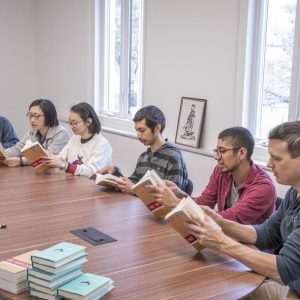
Revisiting Questions and Prejudices in the Classroom
It is in the nature of discussion-based classes to question and examine the content we learn with others. Prior to becoming a DRBU student, I leaned towards the notion that not all questions are valid in the classroom. There is a way to bring forth questions thoughtfully, moving towards truth, and only after reflecting upon them yourself is it appropriate to present to others. In my experience at DRBU, however, I have grown to appreciate the sentiment “there are no stupid questions” when sincerely examining a text with others.
When I encounter challenging passages while reading, I approach them using one of two methods; the easy and less fulfilling method is interpreting what I read to confirm what I already know, while the more difficult method is seriously considering what a text has to offer by reexamining the views I hold true. During my close reading of Truth and Method by Hans-Georg Gadamer, for example, I was challenged by one such passage: “The meaning of belonging—i.e., the element of tradition in our historical-hermeneutical activity—is fulfilled in the commonality of fundamental, enabling prejudices” (295). Truth and Method is about hermeneutics, the methodology of interpretation. Gadamer is describing here the conditions that let us identify with tradition, or our sense of belonging within a context. My prejudices, which I normally view as hindrances to true understanding, are actually the foundation of meaningful interpretations.
It was difficult for me to accept at first that prejudice, which holds a negative connotation, is essential to interpreting any given thing or situation within our “historical-hermeneutical activity”, or participation in life. I found it easier to be dismissive of Gadamer rather than seriously consider what he had to say. My initial reaction towards Truth and Method was that it was verbose and abstractly written without any practical takeaway. This reaction is a prejudice. I am used to reading low to medium pieces of writing with easy to digest messages. This is a preconceived experience and prejudice I brought with me during my reading of Truth and Method. But without this prejudice, I would not have been able to approach Gadamer in any meaningful sense. Prejudices may come close to an author’s intended meaning or entirely miss the mark, but they are essential to the process of understanding regardless. There is no ideal blank state or way of approaching a text without prejudices; instead, prejudices form the basis of initial interpretations which can be developed further by being open to what others have to say.
When it comes to prejudices in a group discussion, they are just as valid as the prejudices we use to understand a text with. It was initially easier for me to engage in discussion combatively rather than openly, but understanding the validity of prejudices has helped me see the value of other perspectives. I no longer have to view questions that veer from my own interpretations as obstructions to truth, but rather, as avenues to a greater understanding of a text or experience.


